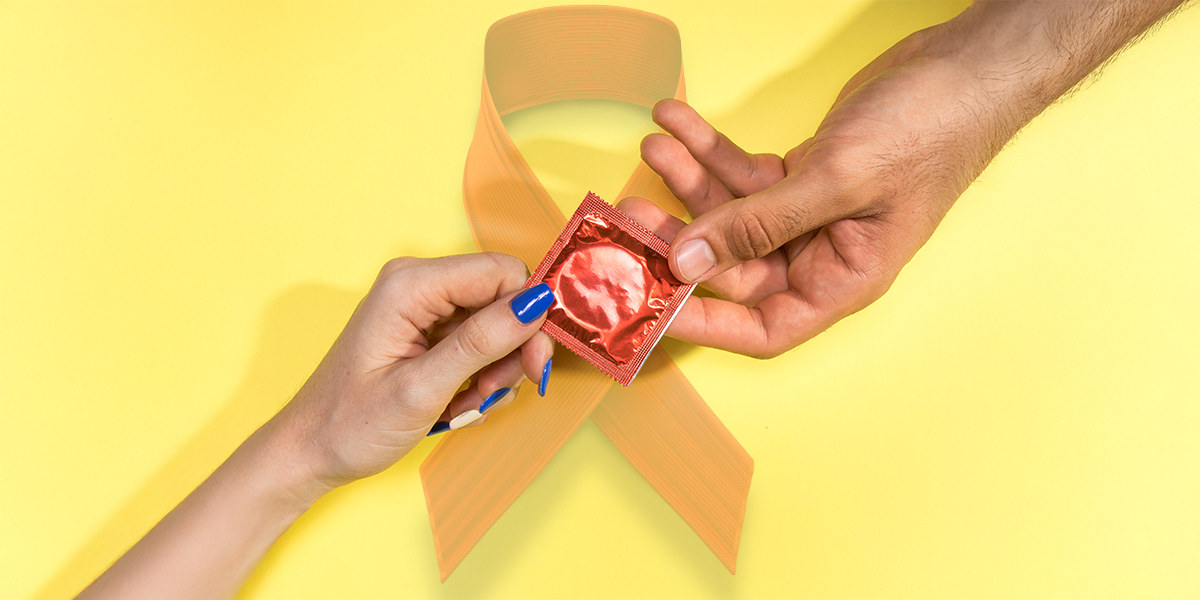Campagnes de sensibilisation
Protecting against HIV and STIs: Practise Safe Sex to Stay Healthy
To stay safe this summer, get protected and get tested! That’s the advice from Dr Bruno Taillan, Vice-Chair of Fight Aids Monaco and Head of General Medicine, Haematology and Oncology at Princess Grace Hospital. MonacoSanté has the lowdown with everything you need to know.
Your first line of defence: condoms
Condoms, testing and treatment: Dr Bruno Taillan outlines the essential steps you need to take to stay safe this summer. “Summer is a time when people travel. They feel the need for freedom. That often means drinking more alcohol and taking more drugs. And when they meet new partners, men or women, people forget to take some basic precautions. Condoms are the first line of defence,” explains Dr Bruno Taillan, Vice-Chair of Fight Aids Monaco and Head of General Medicine, Haematology and Oncology at Princess Grace Hospital (CHPG), with over 40 years of medical experience. His department currently provides ongoing care for 650 HIV-positive patients. In addition to HIV, the doctor also treats patients with sexually transmitted infections (STIs). “With more liberal social attitudes and people having more sexual partners, other sexual infections like hepatitis A and B, gonorrhoea, syphilis, chlamydia, and human papillomavirus are becoming more common and potentially more severe. Because while most of these infections are treatable, it is crucial that they are diagnosed early enough,” he explains.
If you engage in high-risk behaviour, you must get tested
“Some complications can lead to problems later on if not diagnosed or treated. They can cause infertility in women, along with cancers of the throat, the anal canal, the cervix, or the liver in the case of hepatitis. So sexually transmitted infections are not to be taken lightly,” the doctor concludes. “High-risk behaviour means having unprotected sex with multiple partners. If that’s you, it’s essential to get tested regularly, even if you have no symptoms,” he explains. Dr Taillan recommends that anyone engaging in high-risk sexual behaviour gets tested every three months, the absolute priority being to break the chain of transmission. The same goes for HIV testing. “All patients carrying the virus and living in Monaco are screened, treated, and monitored. That stops it from spreading.” Reassuring news, but it’s important not to let our guard down.
The over-50s now a priority group
“Don’t assume that STIs only affect gay people. They affect everyone and all ages, whether you’re straight, gay, or bisexual. If you’re having unprotected sex with casual partners outside a stable relationship, then you’re at risk,” insists the Vice-Chair of Fight Aids Monaco. If medical advice is sought within 48 hours of potential exposure to syphilis, gonorrhoea, or chlamydia, a course of antibiotics ranging from one to fourteen days can be prescribed, depending on the infection and treatment. Although Dr Taillan says that the 18-25 age group is still at high risk of infection, there’s an increasing focus on the over-50s. “Patients over 50 must absolutely not assume they’re protected. While it used to be the case that younger people were primarily affected, we know that the over-50s now account for a larger proportion of new cases, such as AIDS.”
PrEP: a pre-exposure treatment that protects against HIV
PrEP is intended for people who do not have HIV. It involves taking medication preventively to avoid infection. A doctor prescribes one Truvada tablet daily until the risk period is over. “Recent surveys all show that between 40 and 50% of young people think you can catch AIDS from a handshake! Many people believe it can be caught by kissing, shaking hands, or drinking from the same glass. They’re clichés, but that’s the reality. It’s scary that people still believe such nonsense in 2025!” Dr Taillan exclaims. He goes on to say: “Today, we have all the tools needed to prevent infection - treatment before, during, and after.” And huge strides have been made in research and medicines. With early diagnosis and proper treatment, AIDS is no longer fatal. People with the disease have a normal life expectancy. “Medically, you take the tablet, you treat it, and everything’s fine. We do regular outpatient check-ups. There’s no need for people to be hospitalised. But the patient’s personal, social and professional life is turned upside down. People don’t tell anyone, even their family. They live with a secret, and sometimes it can be a heavy burden to carry,” says Dr Taillan.
Maison de Vie in Carpentras
The Maison de Vie in Carpentras is another initiative launched by the charity Fight Aids Monaco. “It supports HIV-positive patients undergoing treatment for between one and three weeks, often struggling with personal, family, or professional issues. It’s somewhere they can rest, recharge their batteries, and rebuild their self-confidence,” says Dr Taillan, who has served as chairman of the centre since it opened in 2010. “If we are to change social attitudes, control the epidemic, and break the chain of transmission for all these diseases, we must stress the importance of prevention and testing,” the doctor insists. Throughout the year, Fight Aids Monaco organises free testing days in various locations around the Principality, as part of scheme called “Test in the City”. The aim is to raise public awareness about the risks of HIV infection by offering rapid tests. Anyone can find out whether they have HIV within just a few minutes. The next Test in the City event will take place at the end of September 2025. The Principality of Monaco also has its own screening centre at Princess Grace Hospital, where anyone can get tested anonymously for free.
Practical information:
Opening times: Mondays and Thursdays, 8 am to 6 pm / Tuesdays, Wednesdays, and Fridays, 8 am to 5 pm / No appointment is necessary. Free and confidential.
Contact details: Centre monégasque de dépistage anonyme et gratuit (CMDAG) Princess Grace Hospital, Pavillon Louis II (level -01)
Tel: 00 377 97 98 84 12

